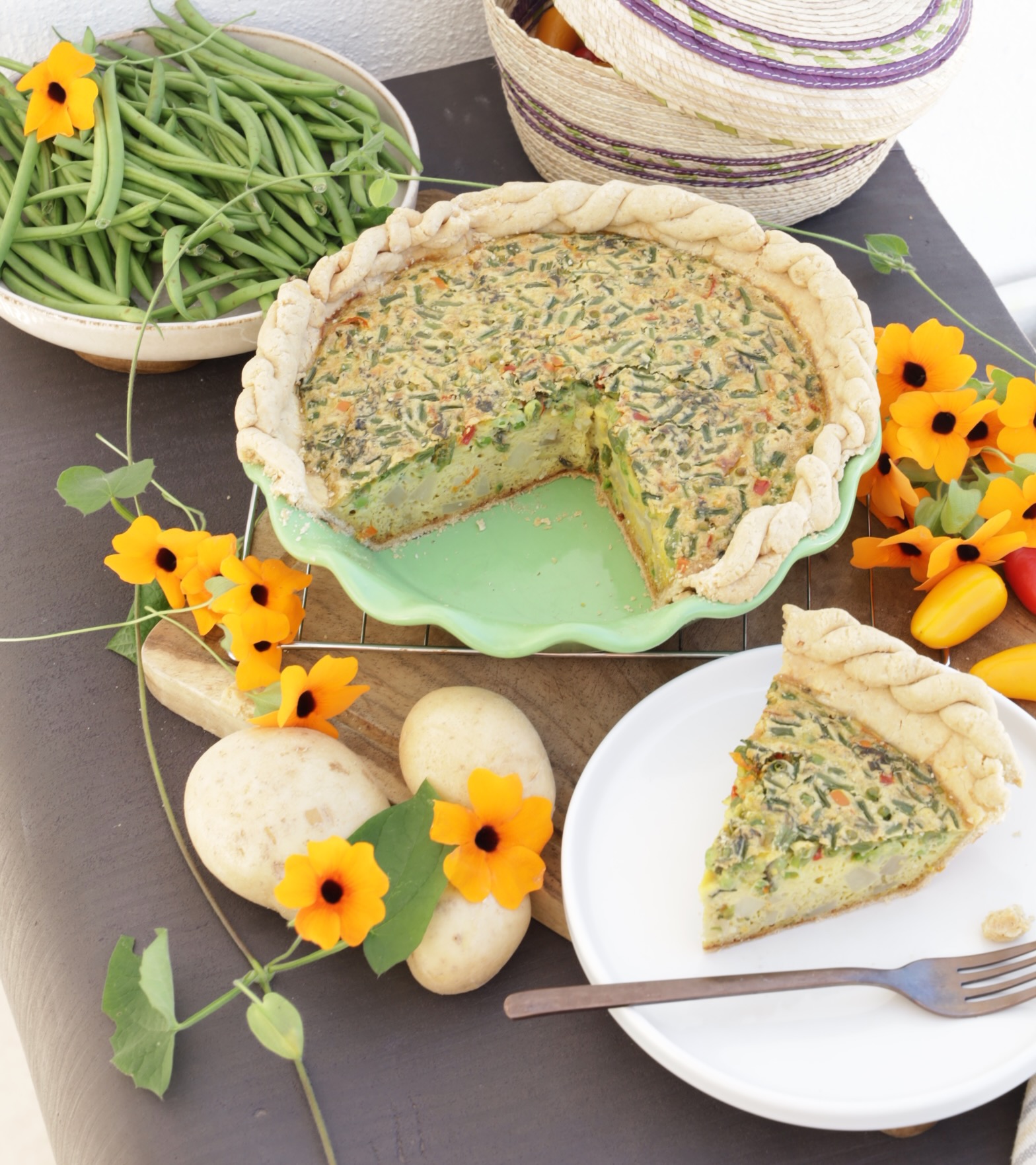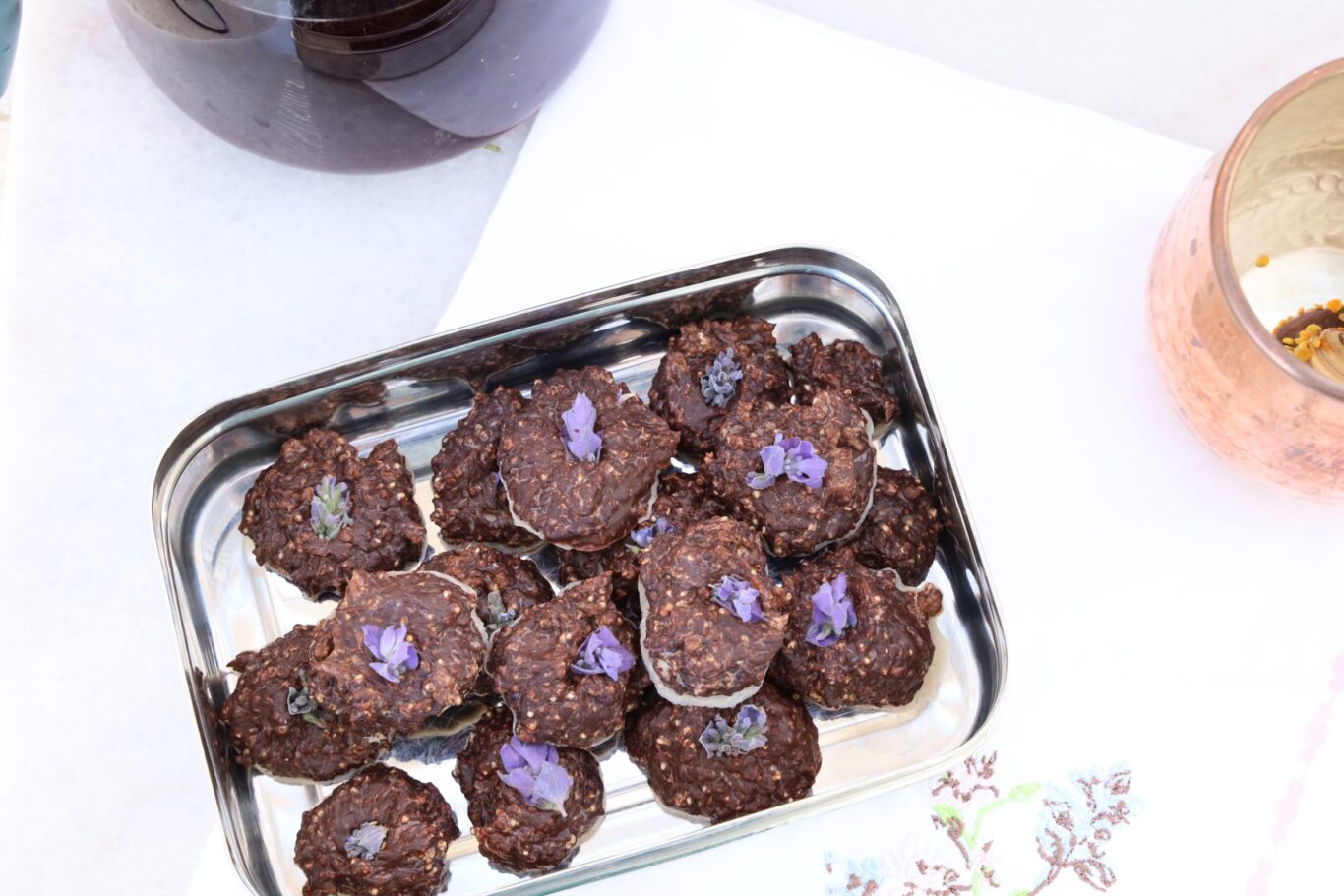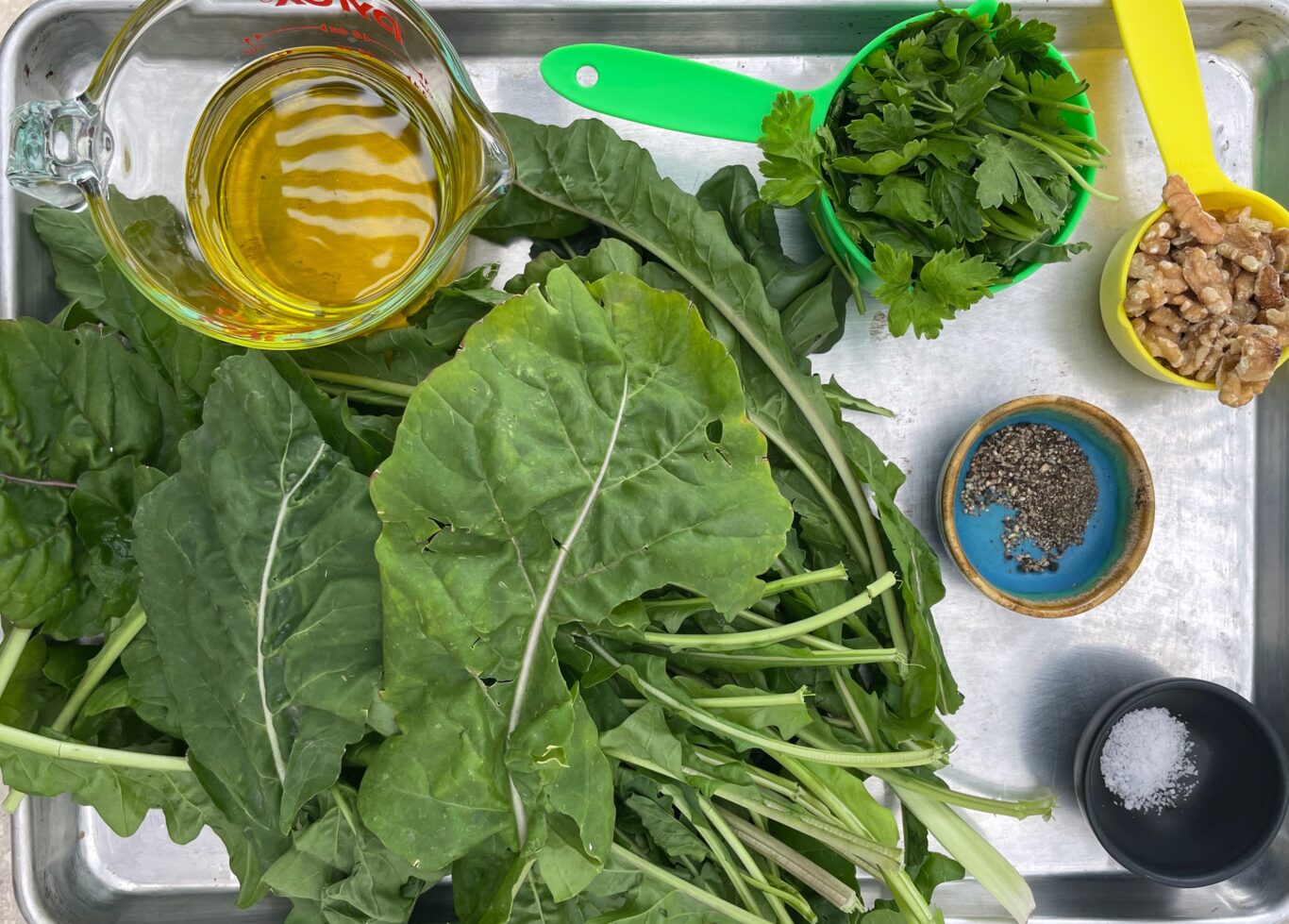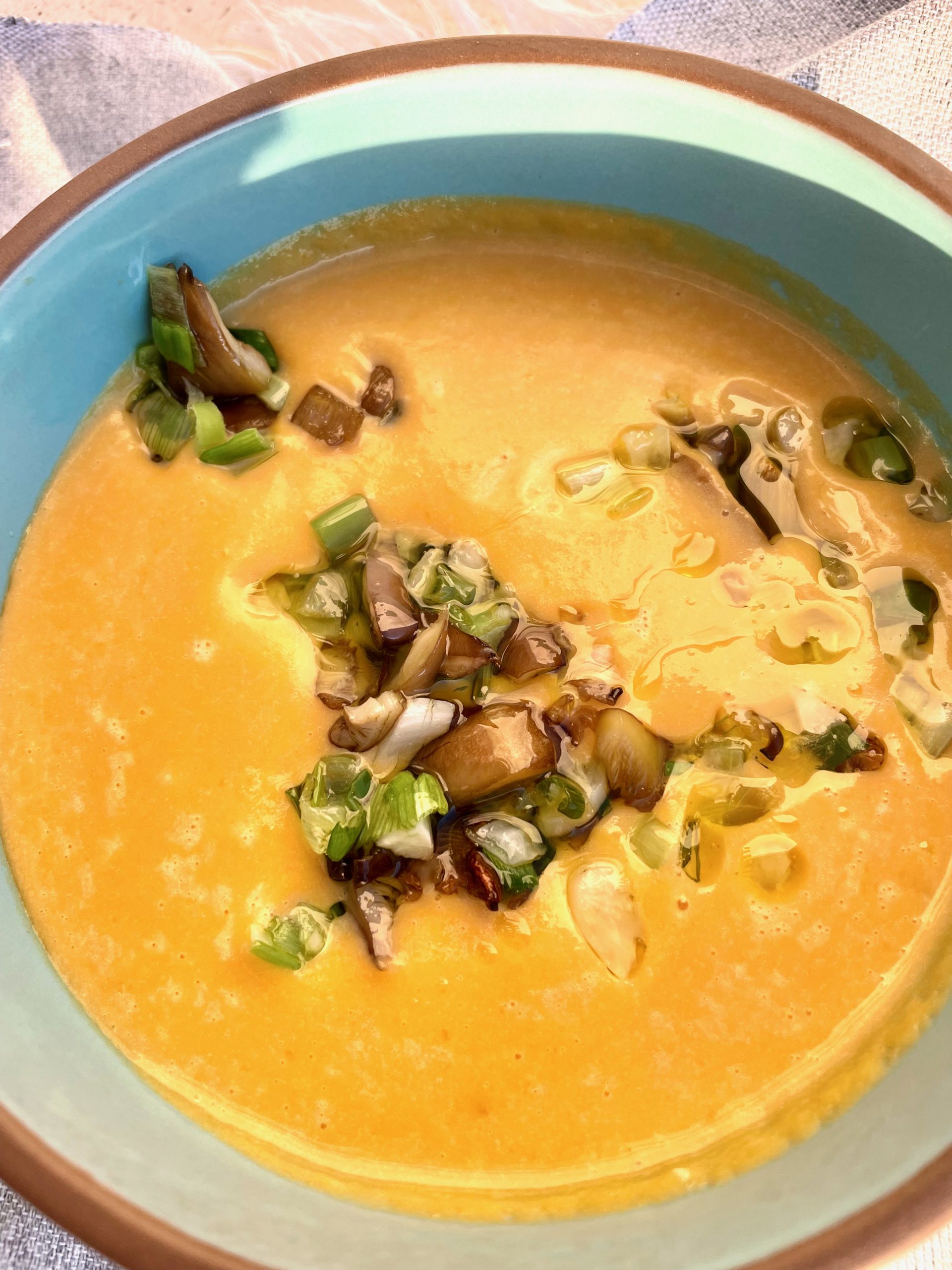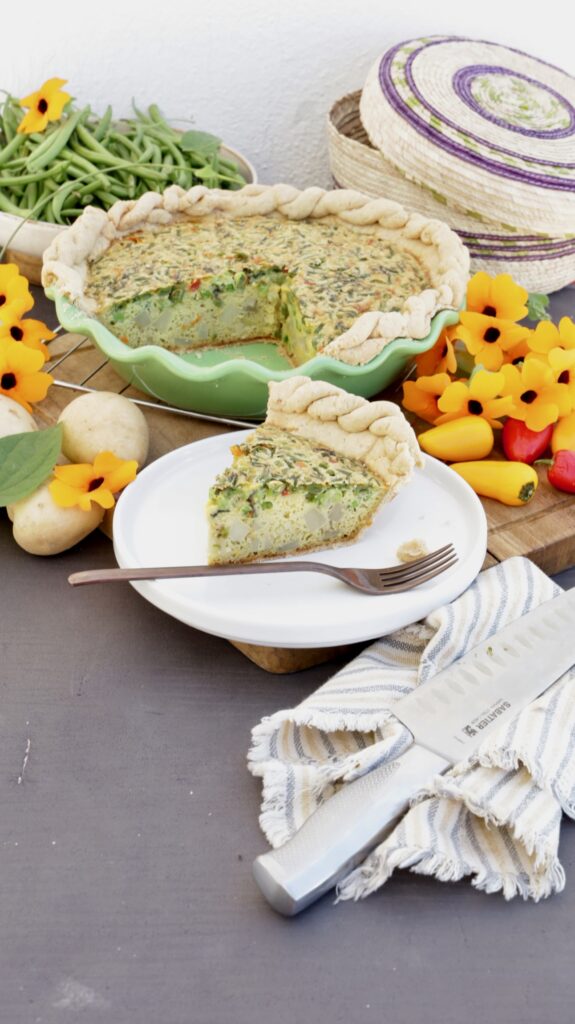
Eggs and Choline
Choline is vital for metabolism, building cells, and the nervous system, and cognitive development and function. It is vital for the synthesis of the neurotransmitter acetylcholine. Without sufficient levels in pregnancy this can negatively affect cognitive development. A plant-based diet is suggested in pregnancy with fish and at least 3 eggs daily to get your B12 and a minimal of 30 μg of biotin in three eggs. I personally believe, after 5 years of research and writing the book, Nourishing Generations: A nutrition reference manual for pregnancy and lactation, that I did not eat enough eggs, fish, and even animal products during pregnancy. I did eat some, and ate more during lactation, thank goodness. But I was so used to being vegan that this was mostly what I ate. I hope to educate other healthy woman, and women who want to be healthier about the merits of a plant based diet with the regular consumption of eggs during pregnancy. The nutrient to volume ratio of eggs is extremely high in terms of nutrients, protein, and the right types of fats such as choline. If you are vegan or not consuming eggs during pregnancy this WILL affect the development of your child’s nervous system. The most recent science shows that choline needs are a minimum of 450 -560 mg for pregnancy, and 520-560 mg for lactation. Athough plant foods do provide some choline, you simply cannot get enough with even the most amazing plant based diet. I have analyzed many weeks of nutritional intake in order to try to reach these levels.
The truth is that most women are not getting enough. If you got in half this amount I would consider that to be excellent, especially in light of the fact that the American Dietetics Association does not address choline needs for this critical period with an RDA, although the Institute of Medicine does suggest an AI of 450-560 450 -560 mg for pregnancy, and 520-560 mg for lactation which is the amount need to prevent liver damage and malfunction (NALFD/Non-Alcoholic Fatty Liver disease). You can reach above that with 2 eggs a day (an egg provides around 300 mg choline) and regular consumption of legumes which are really the main source of choline besides eggs.
B12, along with sufficient folate, B6, riboflavin and choline, is required to regenerate methionine from homocysteine which then provides methyl groups. These methyl groups are then attached to DNA and other proteins that hold onto DNA in such a way that the genes are activated, inactivated, or put in a form where a certain environmental stimulus will cause them to be activated or inactivated. In some ways this is more important than the genes themselves because this directly affects the expression of the genes, and the expression continues for at least 2 more generations.
Synthesizing Acetylcholine and Red Blood Cells: CoA is used to synthesize acetylcholine and red blood cells, the latter of which increase during pregnancy. Therefore a severe lack of choline can contribute to anemia Remember that choline is also required for the other half of acetylcholine. The acetyl group comes from pantothenic acid or vitamin B5 through a several step series of activation.
For pregnant women, particularly, ensuring a diet that balances both cholesterol and vitamin K needs is paramount during this critical phase. The author recommends daily egg consumption for pregnant women, citing multiple benefits. Eggs provide the most easily digestible form of protein in addition to the crucial cholesterol that pregnant women cannot synthesize internally, along with significant levels of pregnancy nutrients such as choline, B12, B6, vitamin A, biotin, vitamin D (Shahrook et al., 2018).
It is not generally recommended to supplement with choline during pregnancy unless you have a risk of a preterm baby or other birth defects, therefore the best choline supplement in pregnancy is to eat 2 eggs a day. This has the added benefit of providing cholesterol which is not synthesized in high enough quantities during pregnancy by the body. One of the main reasons for this is that 80-90% of supplements are contaminated with heavy metals, and if you are eating organic, free range eggs from happy chickens on a farm, you are not contributing to environmental degradation.
Supplementation should be undertaken when you have a risk of a preterm baby or of non-neuronal birth defects like cleft lip or hypoplasia of the jaw, or a defect of folate metabolism. In this case it is essential to stay within the recommended intake limits, with the Tolerable Upper Limit set at 3500 mg/day. It is also best to consult with a nutritionist regarding what supplement to take so she can research the safety data on a supplement and see if there is any independent 3rd party testing done on the purity of your choline supplement. Or, of course, you can also eat the right foods. Seafood is another excellent source of choline, but again, they type of seafood is important to prevent contamination of your body and negate environmental impact.
Choline intake is most important in the third trimester and lactation. It is so important for fetal development that the placenta has special mechanisms to uptake choline from the mother so the mother ends up being deficient. So if you want mom to function well after birth, please feed her some eggs, with love, an ex-vegan! To read more on this topic you can check out the book, Nourishing Generations, by Carmen Cook, on Amazon and other places.

Vegetable Quiche
Equipment
- 1 Pie pan or baking dish
Ingredients
- 1 medium size baking potato
- 1 cup raw peas
- 1 1/4 c green beans measured after dicing, about a very large handful before dicing
- 2-3 small colored sweet peppers
- 6 medium eggs
- 1 cup sheep milk or coconut milk
- 2 T GF flour mix
- 1 t baking soda
- 3 sprigs thyme
- A light sprinkle of rocky or course ground sea salt added to the top at the end
- Optional: 1 cup parmesan or manchego cheese
Instructions
- Chill your 2/3 c coconut oil to make your pie crust in the freezer.
- Wash, peel, and dice potato and begin cooking in boiling water that is lightly salted.
- After the potato has cooked for 10 minutes, add in the green beans, peas, and peppers
- Green beans should be cut into small sections as wide as the potato dices, or a bit wider than a pea. The peppers should be finely diced.
- After all the vegetables cook for 10 minutes, strain.
- If using frozen peas, you do not need to cook them, just let them defrost, or add the frozen peas to the simmering vegetables for 30 seconds before straining.
- Make your piecrust using the coconut oil that you slice into pieces like chunks of butter. (2 c flour, 1/4 – 1/3 c water as needed, 2/3 c coconut oil)
- After making your crust place it in the fridge to chill.
- Preheat your oven to 350 degrees Fahrenheit
- Whisk your eggs in an electric mixer until frothy.
- Add the milk, flour, and baking soda.
- Put the vegetables in the pie crust and pour the egg mixture on top.
- Sprinkle the thyme into the mixture.
- Sprinkle salt on top, more or less depending how much salt you like.
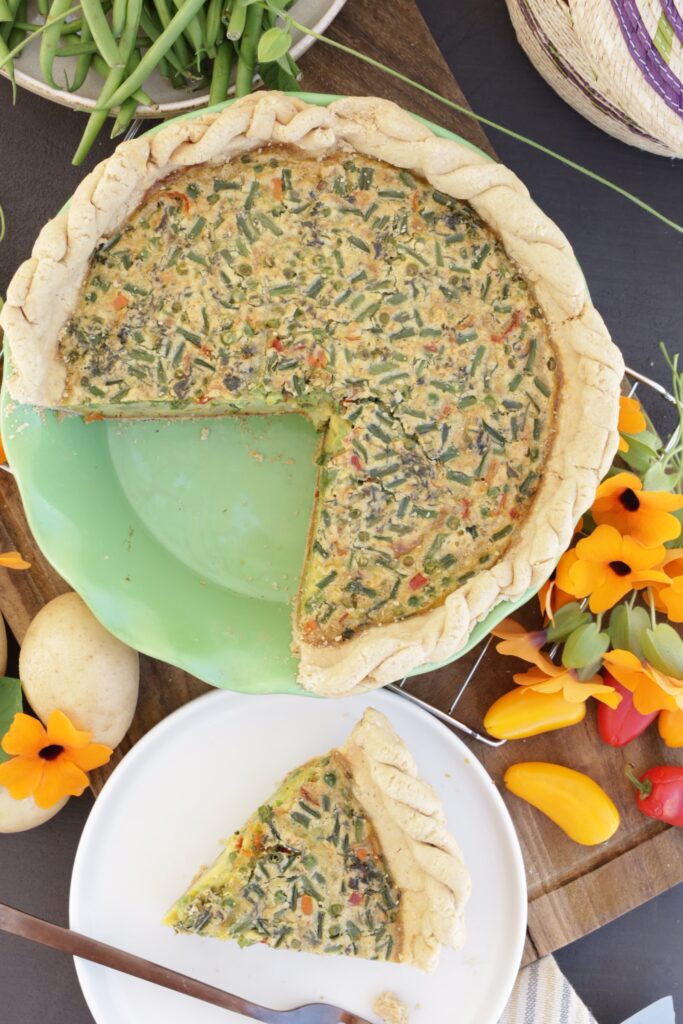
How to make a Gluten-Free Pie Crust: https://www.youtube.com/watch?v=JWOI64MAS_c
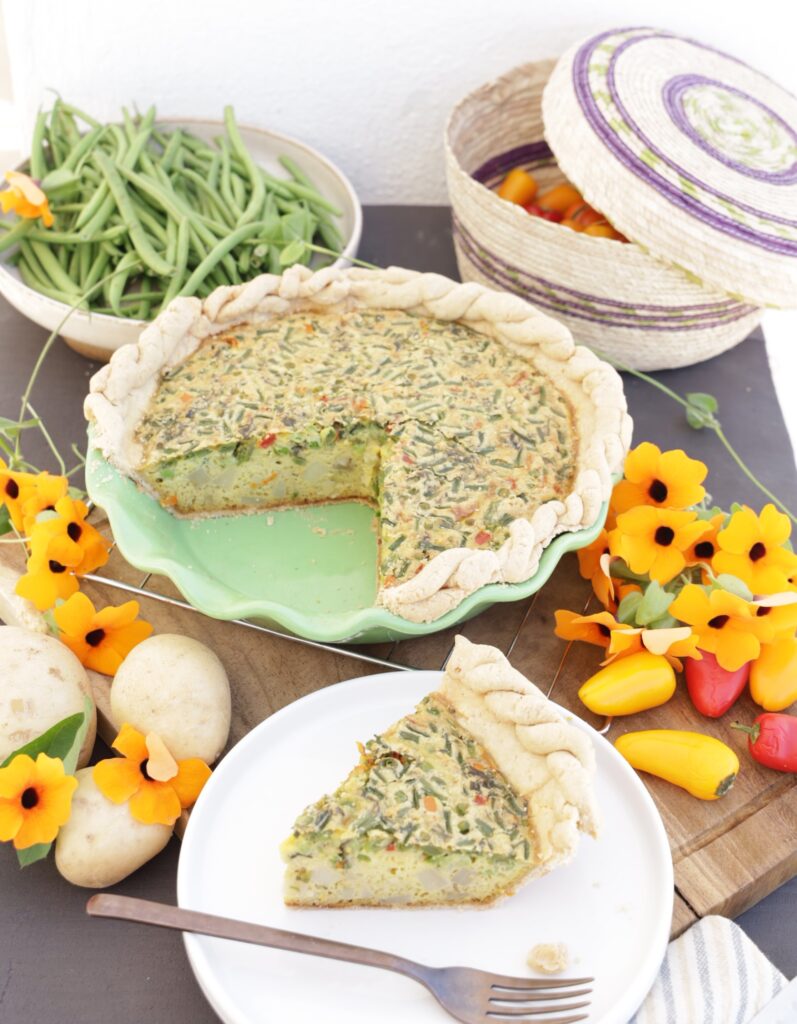
References
Shahrook, S., et al. (2018). “Vitamin K supplementation during pregnancy for improving outcomes: a systematic review and meta-analysis.” Scientific Reports 8(1): 1-11.
Caudill, M. A., et al. (2020). “Building better babies: should choline supplementation be recommended for pregnant and lactating mothers? Literature overview and expert panel consensus.” Gynecol. Obstet 2: 149-161.
IOM, et al. (2006). Dietary reference intakes: the essential guide to nutrient requirements, Washington DC: National Academies Press.
US Department of Agriculture, U. D. o. H. a. H. S. (2021). Dietary guidelines for Americans, 2020–2025.


